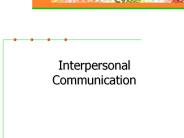COMT 4510 Advanced Interpersonal Communication - PowerPoint PPT Presentation
1 / 19
Title:
COMT 4510 Advanced Interpersonal Communication
Description:
name 10 differences. Different cultures have different world views. How so? ... First date? Describe your best childhood friend. What has changed most in your life? ... – PowerPoint PPT presentation
Number of Views:107
Avg rating:3.0/5.0
Title: COMT 4510 Advanced Interpersonal Communication
1
COMT 4/510 Advanced Interpersonal
Communication Perception Culture and Family
2
culture an accumulated pattern of values,
beliefs and behaviors, shared by an identifiable
group of people who share 1) a common history,
and 2) a verbal and nonverbal symbol system.
3
microculture exists within a culture but has
its own distinct norms. co-cultures several
microcultures existing within the framework of a
culture.
4
Different cultures have different values.
name 10 differences.
5
Different cultures have different world views.
How so?
6
What does it mean to say that each culture is
trapped in its own language?
Aëëåò ÐçãÝò.
7
- Time differences among cultures
- be on time
- each thing has its own time
- hanging loose
8
High context vs low context cultures. Do you pay
attention to setting as communication?
9
- Perceived cultural differences
- high/low context
- individualistic/collective
- challenge authority
- different norms
- tendency to approach/avoid others
- content
- relational differences
10
- Effects of uncertainty about . . .
- Feelings
- attitudes
- politics
- activities
11
England suggests that equality is not so much we
are all the same as it is we are in this
together. How our community turns out depends
upon all of us.
12
- Cultures generate their own symbols, rituals,
customs, formats . . . - every culture has its own communication style . .
.
13
CT 410 Advanced Interpersonal Communication Perc
eption and Family
14
Body Problems
body problems involve issues with location in a
family
15
control
body problems
predictable
unpredictable
disciplined (regimentation)
dominating (force)
dissociated
lacking
body-relatedness
desire
mirroring (consumption)
communicative (recognition)
productive
associated
monadic
dyadic
other-relatedness
16
Stone - impact of family stories. Birthdate/Where
were you born? Parents and Grandparents names,
What did they do for a living? One memory about
each Where did you go to school? what did you
like about school? Least?
17
What was your favorite activity as a
child? Describe the house/town you grew up
in. What made you afraid when you were a
child? First date? Describe your best childhood
friend. What has changed most in your life?/ What
would you change?
18
DeGenova Rice suggest that parental
socialization is one of the strongest influences
in determining children's family formation
behavior. Respond.
19
- From our family we usually learn
- how gender is played out
- how to deal with loss
- how ethnic differences are perceived
- how and if affection is shared
- how family boundaries are managed
- how to deal with conflict
20
end of unit three































